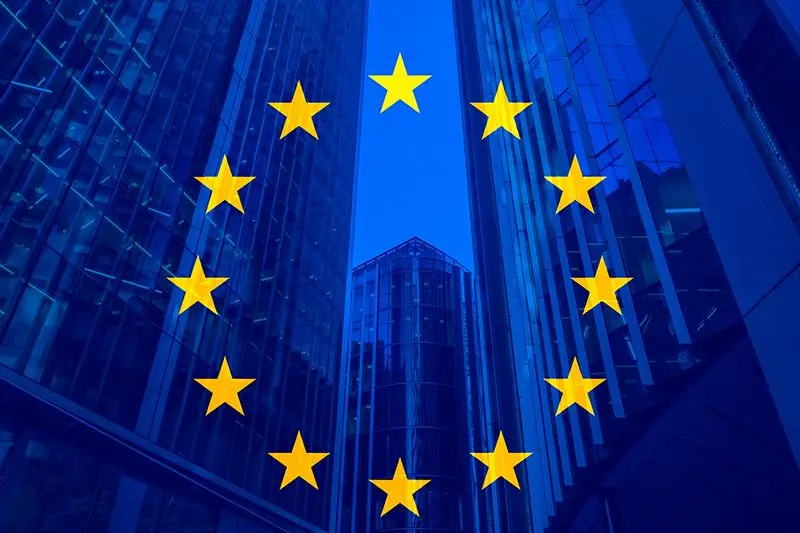PHOTO
The EU is not known for unveiling bold new initiatives, yet this week may be an exception when it launches its new Global Gateway project, widely seen as a counterpart to China’s mammoth Belt and Road infrastructure initiative.
This week’s big announcement, the highlight of the EU-Africa summit starting on Thursday, will see the Brussels-based club kickstart the first Global Gateway regional plan mobilizing up to €300 billion ($340 billion) for public and private infrastructure around the world by 2027. Half of this money is intended for Africa and is focused on renewable energy, reducing the risk of natural disasters, digital connectivity, transport, vaccine production for both coronavirus disease (COVID-19) and other diseases, and education. President of the European Commission Ursula von der Leyen intends to proclaim the EU-27 (the 27 EU member states following Brexit) to be the continent’s “most reliable” global partner.
This underlines how much the approximately 1.2 billion-strong African continent has become a foreign policy super-priority for Brussels and the EU-27. In recent years, there has been a clear European pivot to the continent, increasingly based on investment rather than aid.
In the words of EU High Representative for Foreign Affairs Josep Borrell Fontelles, what is being developed is “a new, integrated strategy for and with Africa” that sees “equal partnership.” Brussels wants to encourage Africa as a champion of the EU’s rules-based, multilateral approach to world order, seeing the EU as a counterweight in the continent to other prominent world powers like China with the “power politics” they are perceived to offer.
Buttressing this massive European economic investment, the EU also wants to strengthen support for African defense and security forces, including through EU military missions. The Brussels-based club currently has 11 military and naval missions across the continent, and examples of ones it is planning to expand include its naval presence off the Nigerian and Somalia coasts.
While this important European pivot is being spearheaded by Brussels, individual EU nations are also doubling down on their engagement with the continent. Take the example of France, whose President Emmanuel Macron hosted last year the first France-Africa summit of recent times.
French influence over its former colonies continues today via political, security, economic and cultural connections in so-called Francophone Africa. Building from this legacy, Macron has announced significant new plans to renew the historical relationship in the face of growing interest in the continent from other countries.
Outside the EU, the UK is another key European power with a renewed focus on Africa. For London, the continent has assumed new importance with Brexit as UK officials seek to consolidate ties with key non-EU nations following the 2020 departure from the Brussels-based club.
Yet, it is not just Europe paying close attention to the continent given its long-term growth potential, post-pandemic. Several great powers like the US and China, plus other states like Turkey and some Gulf nations, are also showering Africa with greater attention, giving its countries more diplomatic options than in the past.
It is China that has invested most time and money in Africa in recent decades, a point illustrated by the fact that its top leadership (the president, premier and foreign minister) have reportedly made a staggering total of around 80 visits to over 40 different countries there over the past decade alone. Beijing is aiming to better connect its Belt and Road initiative increasingly with the continent’s development. As a result, trade and investment between the two powers have risen massively, with around 40 African countries having signed onto Belt and Road, and Beijing a frequent host of China-Africa Summits.
Under President Joe Biden, the US is also stepping up its interest in the continent, although the new administration in Washington knows it is playing a game of ‘catch-up’ with China. The Biden team is seeking to turbocharge US policy via the US Prosper Africa initiative, which seeks to substantially increase two-way trade and investment.
While the administration is framing the initiative as a way to promote shared US-Africa prosperity, it is also designed, in part, to counter China in the region. It is trying here to learn the lessons of the Trump years, when US policy toward Africa lacked coherency, clarity and urgency. Key administration figures, including former National Security Adviser John Bolton, often acknowledged that China was “interfering with US military operations and posed a significant threat to US national security interests” across the continent.
This exemplifies that, while the upsurge of foreign attention to Africa often reflects economic calculations, broader geopolitical considerations are also at play too. From the new European pivot toward the continent to the great power game underway between the US and China, international interest in the continent appears only likely to grow into the 2020s given its growing strategic importance.
- Andrew Hammond is an associate at LSE IDEAS at the London School of Economics
Copyright: Arab News © 2022 All rights reserved. Provided by SyndiGate Media Inc. (Syndigate.info).





















